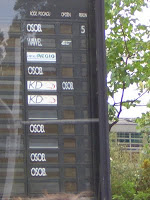
When people travel to foreign lands,they go forth with the hope that they will change the places they visit. Those from different traditions have varied ways of manifesting this, but the intent is usually the same. Russians often refuse to overtly step out of their own cultural mindset. French interact mostly with other french speakers. Americans broadcast their own values to those around them. On a grand scale this may change the local's view of other peoples; without necessarily making it more accurate. Business continues as usual.
One man cannot change the world.When professionals are sent abroad to teach those in other parts of the world, the impact they make often pails in comparison to the cultural impression their foreign co-workers make on them. While I went to Maldives to train it's journalists,the lessons learned and friendships formed will remain a part of me for the rest of my life. For better or worse, one returns from this education forever changed.
It is almost time for me to return again. All that I had to do on my most recent sojourn through the former eastern block has been accomplished. I have received a B2 level Polish certificate, connected with extended European family, and been accepted to grad school.Despite this,I find my self focusing on every day activities of life in Budapest,which soon will no longer be a part of my own. More than anything else they have defined me. They will also continue unimpeded after my departure.
When my plane lands in Los Angeles,the city I grew up in will be exactly the same.But I will be different.As I begin re-adjusting to an old life through wizened eyes I know the process will offer little comfort. I can only yearn to for the next experience -- the newest change to my own world.


 About 4 months ago I was in Kraków, Poland and my e-mail stopped working. When I finally was able to log on I found a message from my Polish cousin saying that she had some business to take care of in another part of the country. She asked if I could come the week after I had planned to do so. I had reserved a trip to the Western Balkans for that week, so I was not able to. Everything still worked out. We picked a week in mid-November for my visit, and I kept my self busy visiting a friend in Slovakia during the week we had originally discussed.
About 4 months ago I was in Kraków, Poland and my e-mail stopped working. When I finally was able to log on I found a message from my Polish cousin saying that she had some business to take care of in another part of the country. She asked if I could come the week after I had planned to do so. I had reserved a trip to the Western Balkans for that week, so I was not able to. Everything still worked out. We picked a week in mid-November for my visit, and I kept my self busy visiting a friend in Slovakia during the week we had originally discussed. My plane departed Budapest's Franz Liszt Airport for Warsaw's Chopin air terminal. Then a bus 6 hours northeast to to the town of Suwałki near the Lithuanian border. My cousin(I call her this for simplicity's sake) Marzanna, her husband and brother met me at the station and drove me along dark road to the family's deary farm in Kowale Olekice.
My plane departed Budapest's Franz Liszt Airport for Warsaw's Chopin air terminal. Then a bus 6 hours northeast to to the town of Suwałki near the Lithuanian border. My cousin(I call her this for simplicity's sake) Marzanna, her husband and brother met me at the station and drove me along dark road to the family's deary farm in Kowale Olekice. 


 In my earlier posts, I commented on the aftermath of the conflict in Bosnia and what I was able to observe during my travels there. Now that I have settled in to Budapest for a semester abroad at Corvinus University in Hungary, I have more time to write. I find it somehow appropriate that I am sitting in front of the computer on the 10th annaiversary of 9/11.
In my earlier posts, I commented on the aftermath of the conflict in Bosnia and what I was able to observe during my travels there. Now that I have settled in to Budapest for a semester abroad at Corvinus University in Hungary, I have more time to write. I find it somehow appropriate that I am sitting in front of the computer on the 10th annaiversary of 9/11.






 My train was 3 hours late, so I was rather ready to get out of my second- hand Slovenian sleeper compartment as the train finally neared the Capital of Macedonia. I had read a lot about the country, and heard it constantly spoken of as the birthplace of Old Church Slavonic by Slavic linguistics majors who I knew. As the train crested the hill, and the skyline of Skopje came into view I was shocked to count 2 short church steeples and 8 towering minarets.
My train was 3 hours late, so I was rather ready to get out of my second- hand Slovenian sleeper compartment as the train finally neared the Capital of Macedonia. I had read a lot about the country, and heard it constantly spoken of as the birthplace of Old Church Slavonic by Slavic linguistics majors who I knew. As the train crested the hill, and the skyline of Skopje came into view I was shocked to count 2 short church steeples and 8 towering minarets.






 This is my fourth time in Poland. However, it was not
This is my fourth time in Poland. However, it was not 









